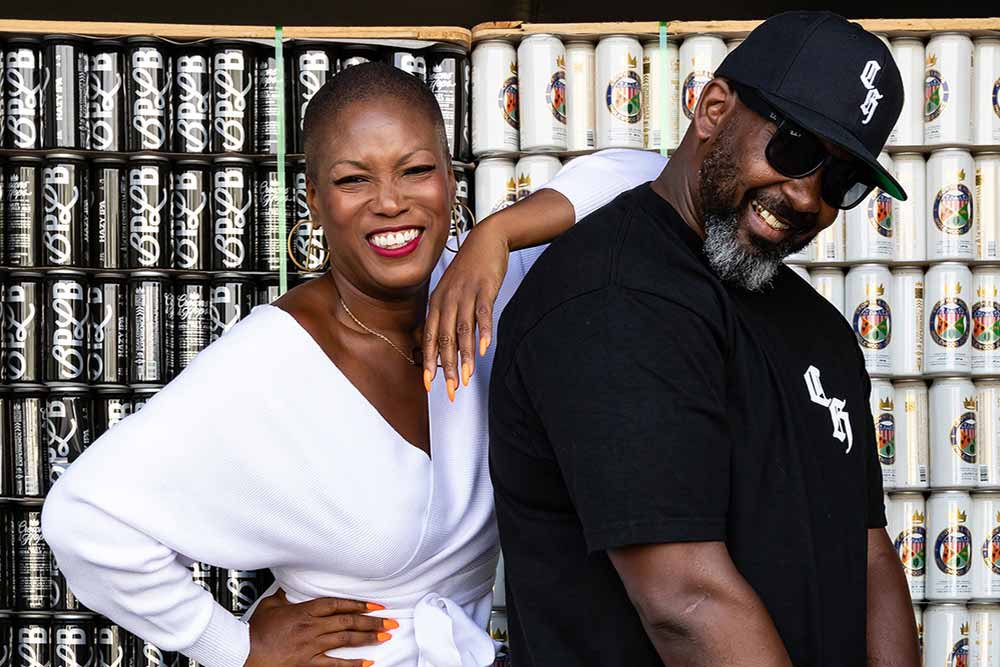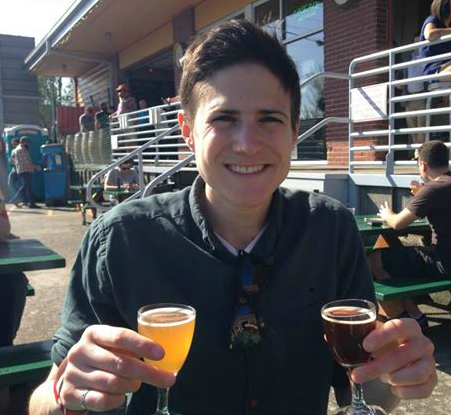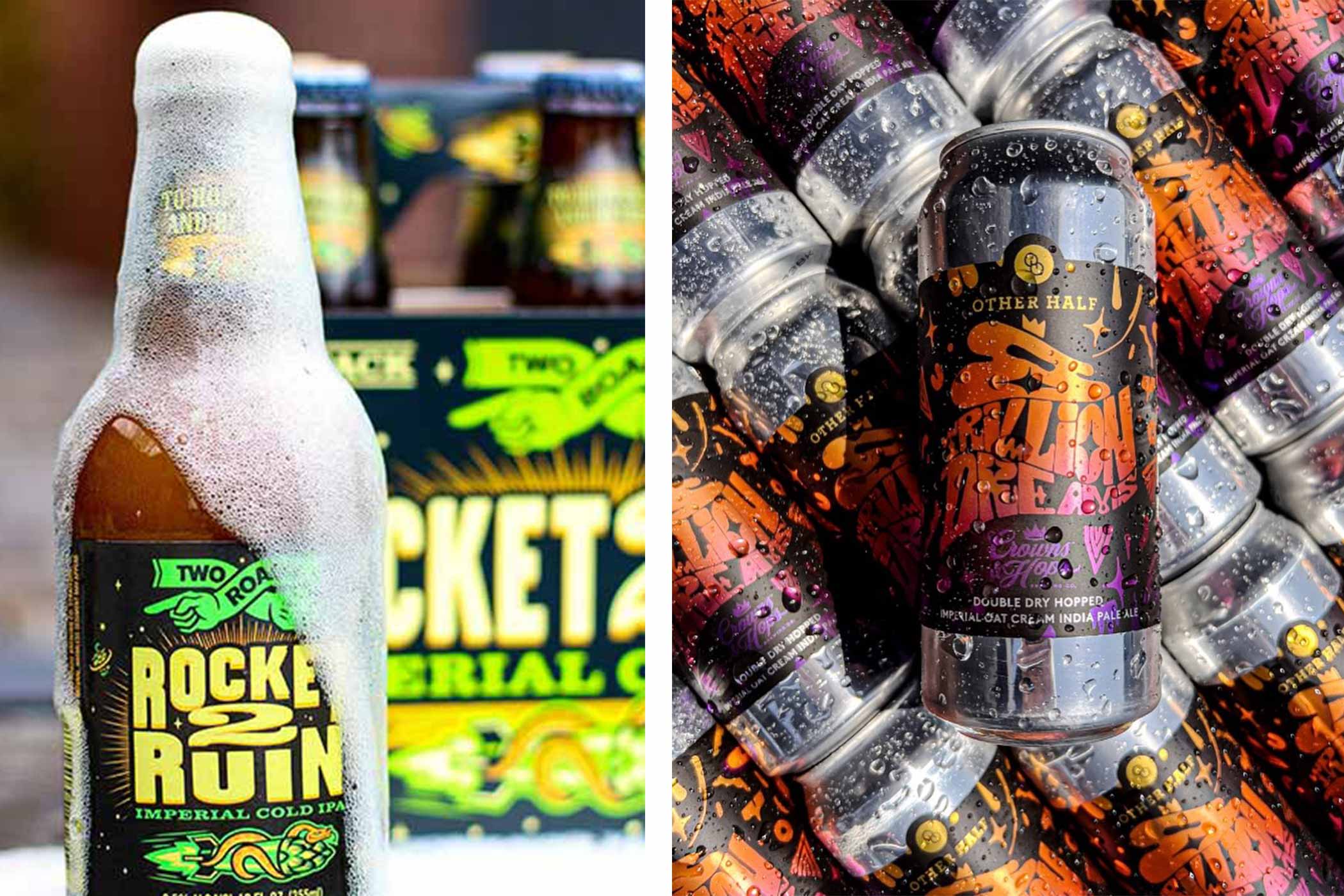Shop
Crowns & Hops: The Dopest, Dankest Disruptors of Craft Beer
Other ???? Stories:
Crowns & Hops has always done things differently.
Co-founders Beny Ashburn and Teo Hunter didn’t come from a background in beer; they didn’t quit finance jobs to stoke their homebrewing passion full-time; they didn’t go to any brewing schools or take part-time jobs washing kegs on the weekend.
Hunter worked in creative production for the entertainment industry. And Ashburn cut her teeth in marketing and advertising at companies like Beats Electronics and Sony.
But that’s exactly why they’ve come into the beer industry and completely turned it on its head like a snow globe, shaking things up something fierce.
Because both believe that the status quo, the placid image of this white-washed industry that has burned into everyone’s minds for so long, doesn’t or shouldn’t apply anymore.
The two focused on their strengths—creativity, marketing, and storytelling—to build brands and later a brewery—Crowns & Hops—that goes far beyond making beer.
Crowns & Hops has completely disrupted the industry, fighting for racial equity while proving that Black and Brown people love beer, drink beer, and have existed here in beer since the very beginning.
A Glitch in the Matrix: From Black People Love Beer to Dope & Dank
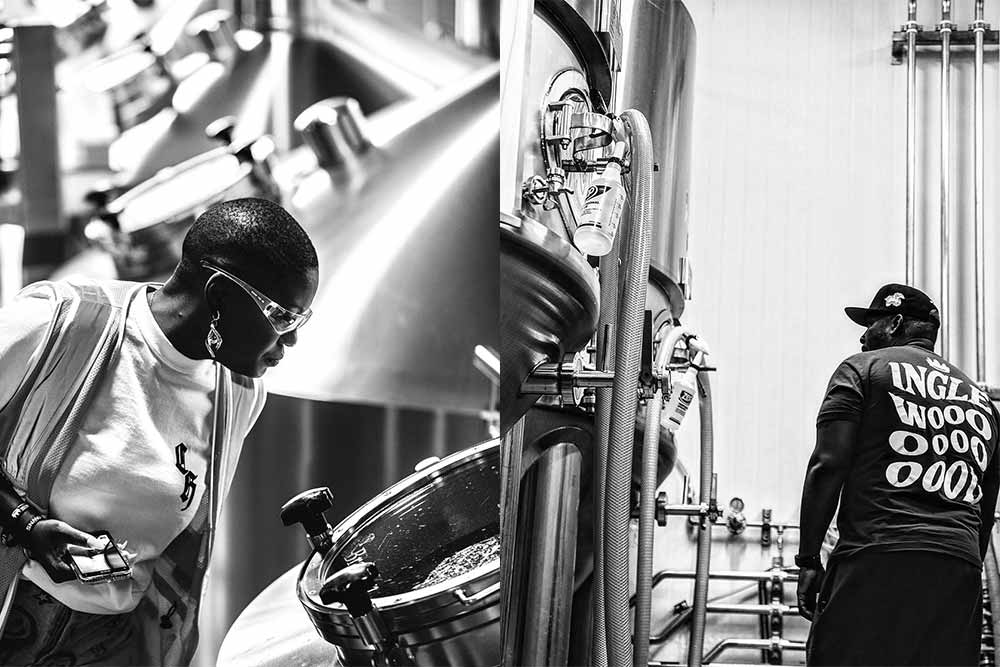
Photography courtesy of @crownsandhops
Hunter stumbled into craft beer after a colleague introduced him.
He immediately started to add up “that I was the only Black dude in a room,” he says, describing the feeling as a “glitch in the matrix.”
Because while he took a shine to drinking craft beer and the energy of the industry, something felt off. “I couldn’t quite put my finger on it,” he says, realizing that the proverbial grit of sand in his shoe was that he couldn’t see himself or his culture anywhere.
Eight years later, Hunter met Ashburn, and things started to click; his passion for beer ran head-first into Ashburn’s marketing prowess.
Together, the two created a concept called Black People Love Beer.
Black People Love Beer
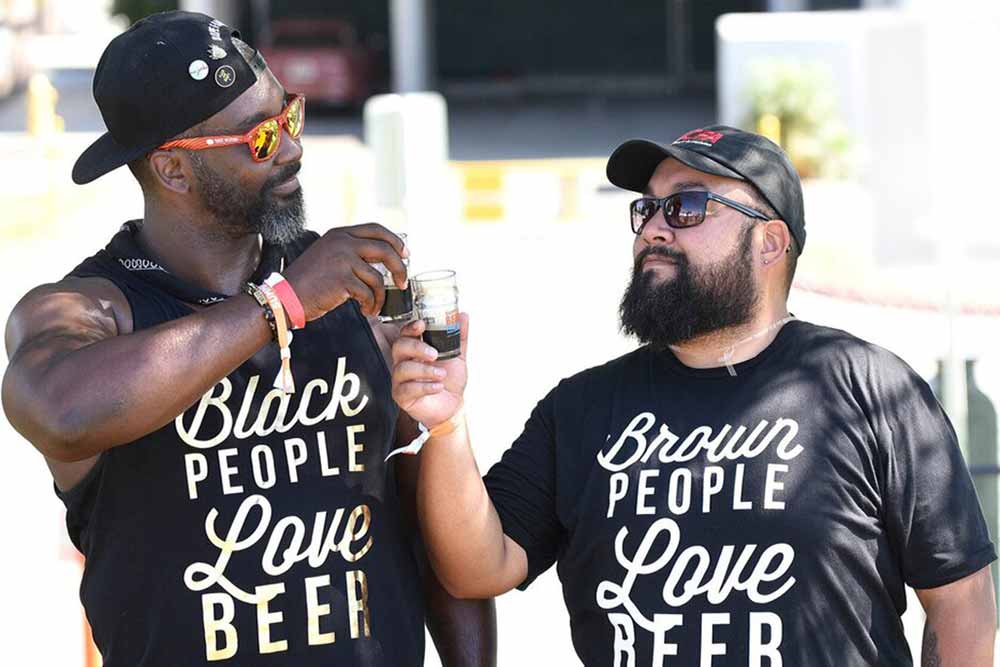
Crowns & Hops Co-Founder Teo Hunter | Photography courtesy of The Michael James Jackson Foundation | Crowns & Hops
While attending a beer festival, Brews On The Beach, in Santa Barbara, the pair filmed their experiences together, sharing them on YouTube. “Obviously not one of the most diverse cities in the world,” says Hunter. “But [Ashburn] told me to just record what I experienced.”
Eventually, more beer festivals and films snowballed into a website and merch—Black People Love Beer (BPLB)—proudly proclaiming that in the craft beer industry Black and Brown people drink beer, too.
“It seemed like a polarizing comment, but it was like, okay, how do you get to the point and have a discussion as quickly as possible without being coy, without trying to be clever?” says Hunter. “We just got to it.”
Hunter and Ashburn could not have clarified their first brand and its mission more clearly.
They came out of the gate boldly stating that black people love beer, too.
You couldn’t miss it.
You couldn’t mistake it.
And you certainly couldn’t sidestep around it or brush it off and change the subject.
“If the conversation got stoked somewhere else, it quickly got snuffed out because people muddled talking about diversity, inclusion, and equity and craft beer with it being political versus anything other than just something that would enrich the community,” says Hunter.
With BPLB, Hunter and Ashburn simply but powerfully stood up and said, “We’re black people of beer,” says Hunter. “It was impossible not to engage with us and have a conversation around diversity and craft beer.”
To stoke the flames, Hunter and Ashburn started a couple of hashtags—#blackpeoplelovebeer and #brownpeoplelovebeer. They caught fire immediately. “How many people use that moniker or an identifier or flag to say, ‘I’m not alone?’” says Hunter. “You are not alone. We are not alone anymore.”
The movement spread.
And the duo began wearing shirts that said “Black People Love Beer” as they continued to travel to festivals and breweries.
People noticed.
Hunter recalls seeing a photo of Ren Navarro, Founder of Beer. Diversity./B.Diveristy. and one of our “Top 10 People to Watch in Craft Beer in 2022,” wearing a Black People Love Beer shirt. That’s when he knew they’d made an impact because others started speaking up, launching their own platforms and initiatives.
Not ones to rest on their laurels, the duo doubled down.
Dope & Dank
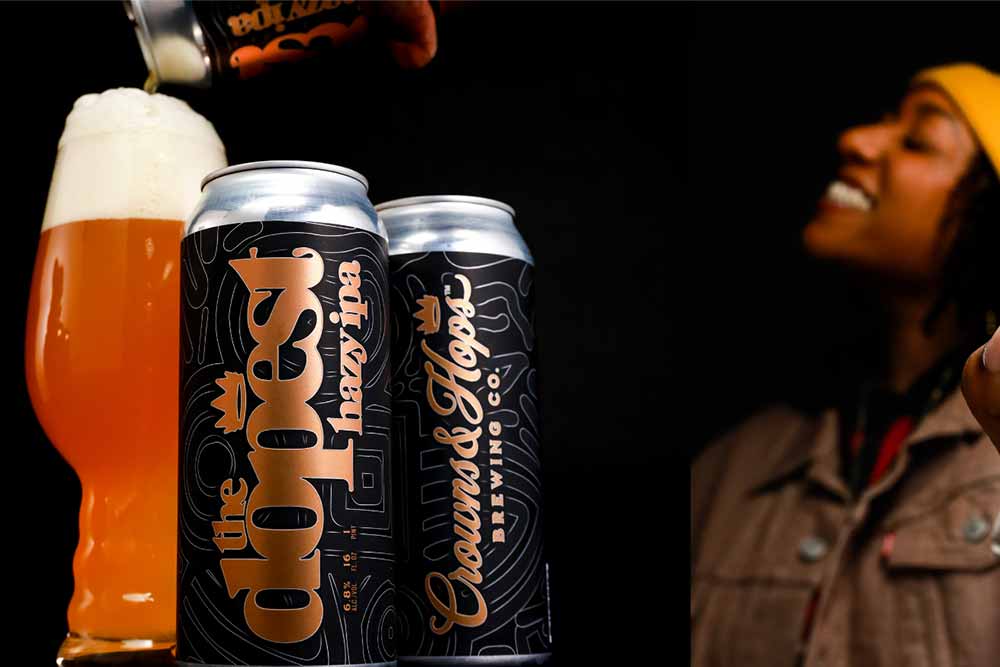
Crowns & Hops The Dopest hazy IPA | Photography courtesy of Crowns & Hops
In 2016, Black People Love Beer morphed into Dope & Dank.
Seven years ago, when Ashburn and Hunter evolved their brand, the craft beer industry predominantly spoke to one particular culture and gender—white men (often with beards).
While BPLB spread across social media, Ashburn and Hunter wanted something tangible to tie to their mission.
BPLB loudly said we’re here, we see you, you are not alone, but it didn’t address the underlying root of the problem or bridge a gap between worlds.
Ashburn and Hunter understood that the craft beer industry lacked a culture that spoke directly to the Black and Brown communities. “No one was speaking to them. No one was galvanizing them,” says Ashburn. “Intrinsically, we are Black, so everything we do will always be through that lens because that is who we are authentically. … We can’t hide it or avoid it; we wouldn’t want to … but we realized that we had to go outside of just Black people and really lean into our cultural capital.”
Dope & Dank connected dope culture with the dank world of craft beer.
The lifestyle brand brought together craft beer through branded streetwear, media, and pop-up events at places like barber shops and salons. They even started collabing with California breweries such as Three Weavers, El Segundo, and Temescal.
“Black and Brown people have always drank beer, but there wasn’t a central place for them to go … to connect, feel comfortable, and have a safe space,” says Ashburn.
Dope & Dank became a beacon, a harbor to drop anchor for the Black and Brown community in the rising tide of beer. But also a brand with enough cultural cache that everyone from all backgrounds paid attention.
And once you begin to turn one head, ten heads, one hundred heads, radical change can happen.
Crowns & Hops: The Official Brewery Disrupting Craft Beer
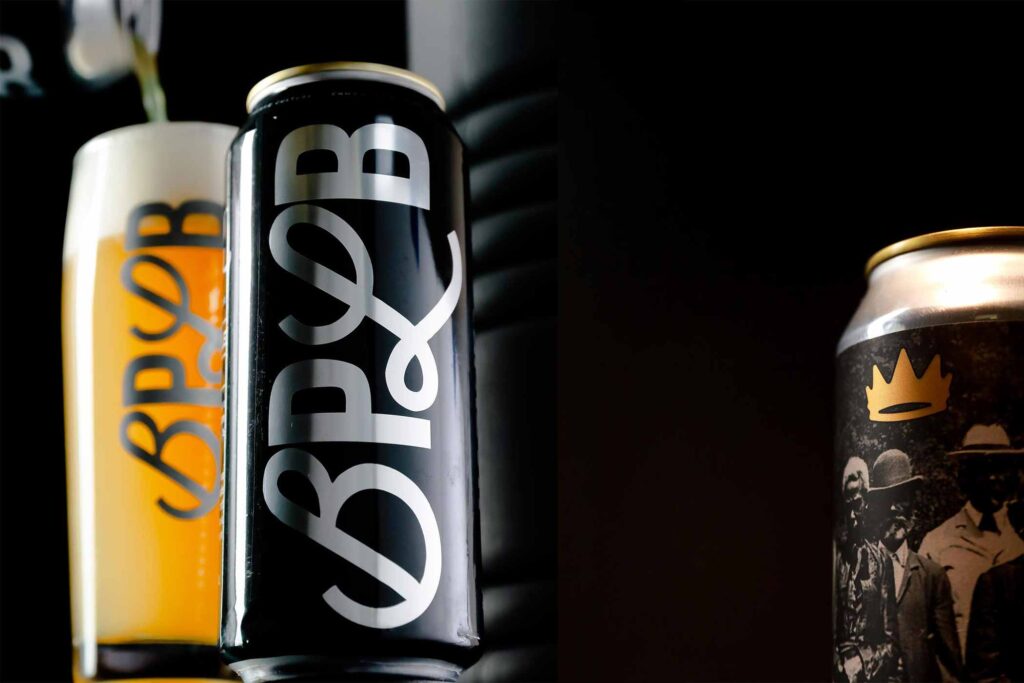
Photography courtesy of @crownsandhops
By 2018, Ashburn and Hunter had garnered a big enough following to turn the heads of some big dogs, literally.
In October of that year, Scottish brewery BrewDog* named Dope & Dank the first recipients of its Development Fund 2.0. And in 2019, Crowns & Hops launched as an official brewery.
With each brand Ashburn and Hunter built, one word continued to tie them all together: disruption.
Have you ever seen a storm with just one lightning strike or a single booming clap of thunder? No. It’s always a cluster of clouds, a litany of electrical bolts and explosions building on top of each other.
Crowns & Hops rained down on the industry in one big tidal wave, a culmination of all of Hunter and Ashburn’s dreams and brands as a rising tide lifting all boats.
As we said, Ashburn and Hunter didn’t take the traditional path in craft beer.
Every step of the way, where others went forward, they went backward.
Where others turned right, they turned left.
Where others zigged, they zagged.
And where others stood still, they ran, leaped, and flew.
Ashburn and Hunter understood they needed to build trust and consistency with people before even making one single beer. “We didn’t start with a product; we started with a brand. We didn’t start with a product; we started with a community. We didn’t start with a product; we started with visualization and storytelling,” says Ashburn.
Sure enough, layer by layer, Ashburn and Hunter started to redefine what craft beer culture looked like.
“If we’re looking at the old-school definition of craft beer, it was bearded, white men,” says Ashburn. “That excluded everyone who didn’t live in that space or in that particular age demographic.”
Today, the world is different.
“What if there is a new definition of craft beer culture?” queries Ashburn. “What if craft beer culture today is not necessarily about the brewers but about the brand in a space where you can actually see yourself?”
Ashburn and Hunter wanted to create a business, and subsequently, a brewery that reflects the world and who they are.
That’s how Dope & Dank started, and that’s where Crowns & Hops is going, “a voice in a new craft beer movement unlike anyone has ever seen or done before,” says Ashburn.
*Editor’s Note: Because the previous actions and allegations against BrewDow do not align with Hop Culture’s values, we have chosen not to promote them in any way throughout the magazine. However, this is a relevant fact to the story that we needed to include here.
How Does Crowns & Hops Go Where No Brewery Has Before?
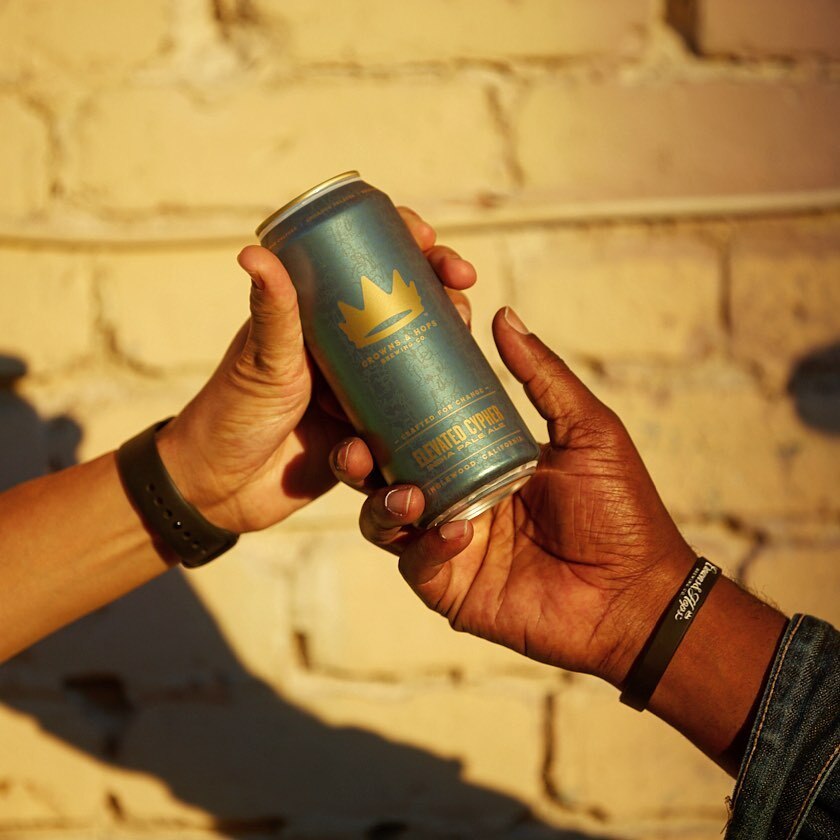
Photography courtesy of Crowns & Hops
In big and small ways.
First, with representation.
Initiating Instagram
When the pair started Black People Love Beer, they noticed something.
While searching databases for license-free images, they couldn’t find one single image of a Black hand and beer. “It did not exist,” says Hunter. “Think about the significance of that. … The world didn’t even see … us in beer.”
So, using each other as models, they created imagery with Black hands and Black people—“all the scope of colors that exist,” says Hunter. “It didn’t exist, so we have to be it.”
From the beginning, the two audaciously changed how people perceived those who drank and brewed beer.
“Once people visually see it, they can digest it,” says Hunter. “They can understand, oh, my god, I didn’t realize; I didn’t see this until it was shown to me.”
As the brands grew, Hunter and Ashburn could hire Black and Brown photographers and digital artists to create content to articulate their message. One that centered around their own backgrounds.
Because Hunter came from the entertainment industry and Ashburn from marketing and advertising, the two had a unique skill set—storytelling.
Hunter and Ashburn weren’t afraid to use emerging platforms like Instagram to their fullest. “Many old-school craft beer brands did not f**k with Instagram,” says Ashburn. “They didn’t tap into creative marketing because it wasn’t an important part of their story.”
Which Ashburn says may have been fine since they only appealed to their local community. “We wanted to talk to the whole nation,” she says. “We wanted to get everyone involved in what we were doing, drawing attention to the world of local craft and the creative role we play in all these various cities and communities.”
From starting #blackpeoplelovebeer and #brownpeoplelovebeer to detailed and creative marketing campaigns, Ashburn and Hunter told their story.
“We built an entire craft beer brand that sold in four states from an Instagram handle,” says Ashburn. “I don’t know if that’s ever been done before.”
Hunter continues, “I think that’s why our brand resonated with so many people, from Black People Love Beer to Dope & Dank to now Crowns & Hops. We’ve been so committed to showcasing Black and Brown culture in a way that very few people had seen up until the point we started doing it.”
Hunter says it starts with leading from the front. “Once we see something that isn’t there, we take the reins and make it happen.”
For instance, the 8 Trill Pils Initiative.
8 Trill Pils Initiative
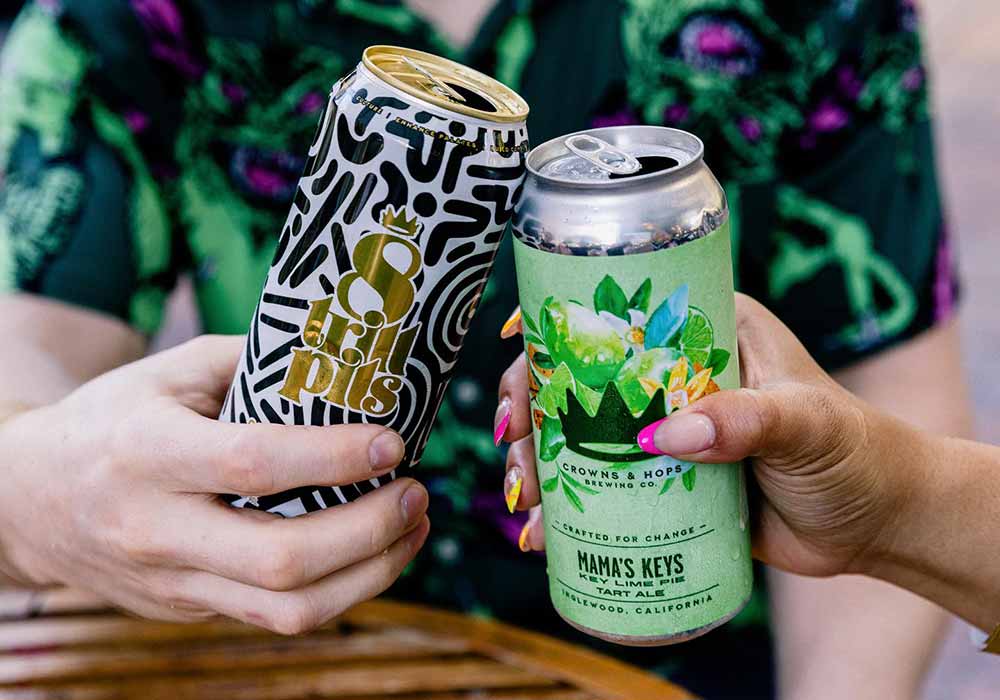
Photography courtesy of @crownsandhops
Inspired by a study published by the W.K. Kellogg Foundation called “A Business Case for Racial Equity,” which found that the U.S. could see an $8 trillion gain in GDP by closing the racial equity gap in the next thirty years, Hunter and Ashburn created the 8 Trill Pils Initiative to support what they feel is the least addressed pillar of DEI—equity.
“People always talk about DE and I; they throw out that acronym so much, but the likelihood they’re only going to talk about diversity and inclusion is extraordinarily high,” says Hunter. “Not have a lot of input or contribution to equity.”
Hunter says that has to do with the systemic hierarchy of our society. “A conversation around equity meant that I’m going to take what you have, and you have to lose in order for me to win,” he says. “But if you peel back the layers on achieving racial equity in this country, it’s ultimately a tide that rises all ships.”
In craft beer, it’s a domino effect. “You don’t just drink one craft beer,” says Hunter, noting you drink another and then another. “The more Black-owned craft breweries there are in this country, the more people will support the industry as a whole.”
This isn’t a win-lose. This is a win-win.
“That is a plan for economic success not only for our industry but also for our country,” says Hunter. “The more Black-owned breweries we have, the more revenue generated for our communities, and the more jobs created for our communities.”
With all this in mind, Crowns & Hops launched the 8 Trill Pils Initiative to raise money for Black-owned breweries.
In the first year, Crowns & Hops raised $100,000 they awarded as micro-grants to five different Black-owned brands nationwide—$50,000 to Montclair Brewing in New Jersey, which helped them buy a new canning line, $25,000 to Patuxent Brewing in Maryland, helping them make significant infrastructural changes, $10,000 Policy Kings in Utah (“We didn’t even know they had Black-owned breweries in Utah!” says Hunter), $5,000 to Crafted For Action in Georgia, and $2,500 to Rhythm Brewing in Connecticut.
“Without a shadow of a doubt, you can see, without us even telling you, the impact for every single one of those recipients,” says Hunter.
This year, Crowns & Hops relaunched the platform with several key commitments.
First, any collaboration they do with white-owned or non-Black-owned breweries will donate a portion of the proceeds to their fund.
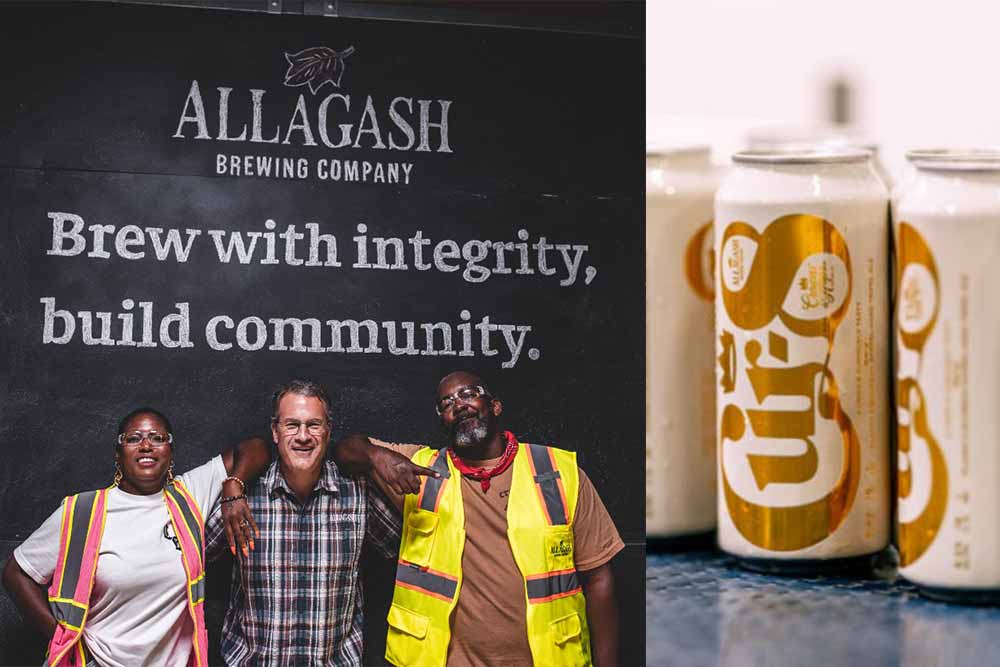
Crowns and Hops Co-Founders Teo Hunter and Beny Ashburn with Allagash Founder Rob Tod making a new collab beer called Cur-8 | Photography courtesy of Allagash Brewing Company
For example, in February, in honor of Black History Month, Crowns & Hops teamed up with Allagash Founder Rob Tod to brew Cur-8.
A mashup of Allagash’s famous Curieux and Crowns & Hops 8 Trill Pils, Cur-8 combined the crispness of a pilsner with a Belgian tripel’s oakiness (along with bourbon and vanilla notes).
Allagash and Crowns & Hops donated proceeds from all beer sales to Crowns & Hops’ 8 Trill Pils Initiative.
“Ultimately, we realized that any brewery collaborating with a Black-owned brewery saw the collateral effect of that fiscally, but the Black-owned brewery did not have an opportunity to see the residual benefit of that collaboration,” says Hunter.
By requiring any brewery they partner with to give back to the 8 Trill Pils Initiative, “we create a path where the efforts of those collaborations ultimately go back to the effort of more Black-owned breweries in this country,” says Hunter.
Most recently, Crowns & Hops collabed with another heavy hitter on the East Coast—Other Half.
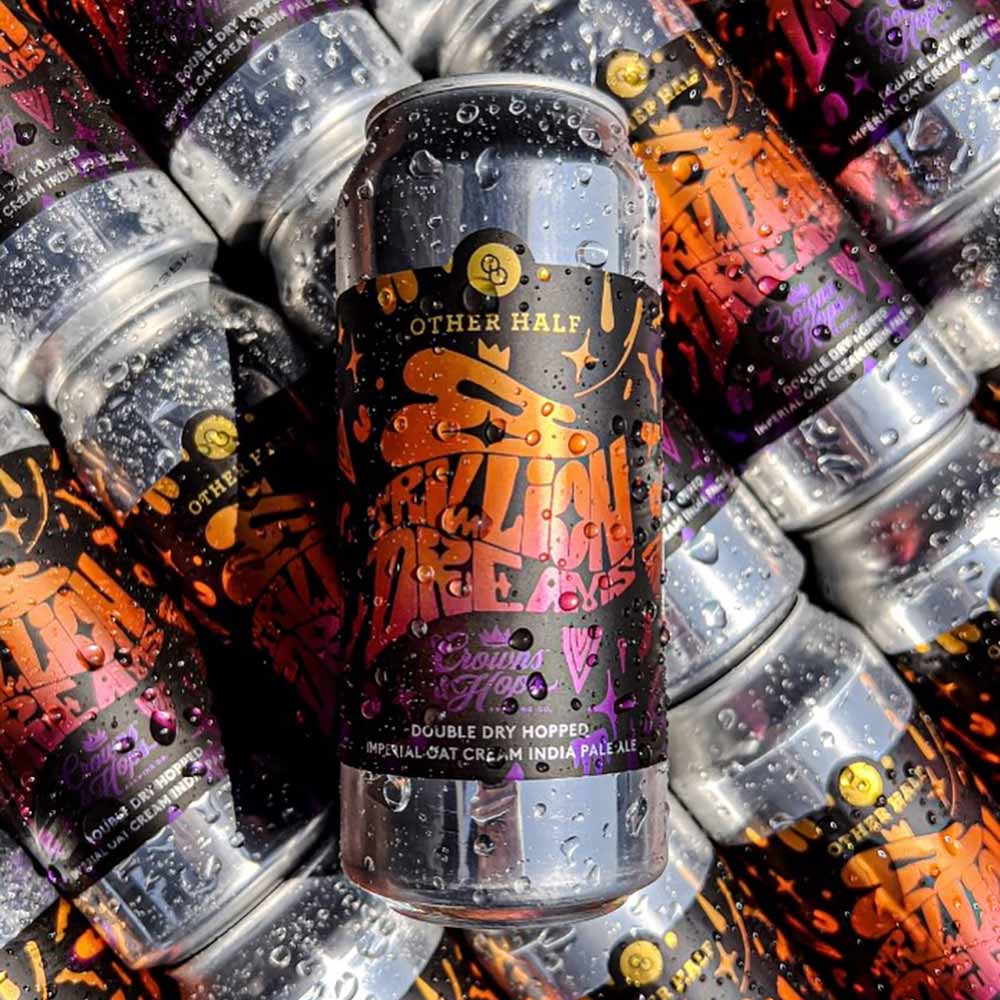
Photography courtesy of @otherhalfnyc
8 Trillion Dreams imperial oat cream IPA debuted at Barrel & Flow Fest, America’s best Black arts and craft beer festival.
Following Crowns & Hops’ commitment, a portion of the proceeds from the sales of 8 Trillion Dreams went right back into their 8 Trill Pills platform.
In addition to collabs contributing to the platform, Crowns & Hops also committed to an entire mind shift.
“Instead of saying we’re less than 1% Black-owned breweries in this country, our goal is to achieve 13% Black-owned breweries in this country, which is the percentage of Black people in America,” says Hunter. “It’s a big goal; it’s a big number, that’s 1,500 breweries, but if they’re 10,000 Black-owned and white-owned breweries, we feel that’s achievable.”
Own Your Crown
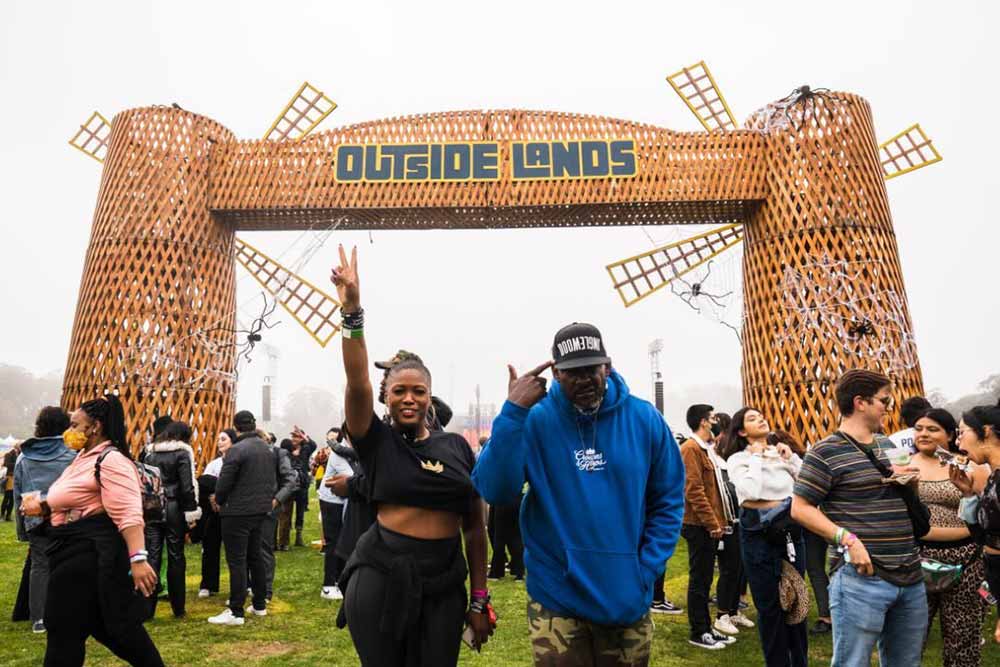
Photography courtesy of @crownsandhops
To hit that goal, Crowns & Hops adopts the following mantra: Own your crown.
“Owning your crown is meant to remind yourself that you deserve the very best, that you can own your authenticity, cultural capital, and space,” says Ashburn. “You don’t have to feel uncomfortable in these spaces where you don’t necessarily see yourself because you have a right to be there.”
No one gave Ashburn and Hunter a place to call their own in craft beer; they made it.
They made it so that others following behind could have that sense of community, feeling empowered to disrupt and create their own.
“As we always say: If there’s no room at the table, build a bigger f**king table,” says Ashburn.
Crowns & Hops is at the head of the table, encouraging people to pull up a seat and reminding them they deserve a place in the room to eat, too.
“Understand we do exist. We want to be owners. We have a seat at the table,” says Ashburn. “We are an important part of the craft beer story as owners and originators of this beverage.”
If you truly look back through history to the very beginning, beer doesn’t come from Anglocentric societies; instead, you’ll find origins throughout Africa and the Middle East.
“Black women have a huge presence in the fermentation process,” says Ashburn. But a dominant group, over time, controlled the narrative.
Hunter mentions the first time he stumbled upon Ninkasi, the Sumerian goddess of beer. “She looked like an Irish woman with red hair and white skin,” says Hunter. “But then I learned Ninkasi is a Sumerian, which is people with skin like copper!”
It is a perfect example of how white people changed the story over time to suit their own culture.
“One of the things that is probably more crippling than anything is for people not to understand their connection with greatness, history, and how they can tap back into that,” says Hunter.
Own your crown encourages Black and Brown people to explore their roots with authorship and craftsmanship in beer.
Hunter did.
Just a couple of years ago, he learned that his great-great-great grandmother brewed and sold beer outside of where she lived in Ferriday, LA. “It was mind-blowing to me,” says Hunter. “These are the stories that are just buried. … When you’re taught that you’re not valuable or you can’t own your crown, then why would you share or pass on this information?”
Knowing your history helps you own your crown.
Owning your crown helps you fight for a place at the table.
A place at the table helps you start a business or a brand, which adds a notch closer to achieving 13% of Black-owned breweries.
Everything circles back to that all-important word: equity.
“Technically, it should probably be EID—equity, inclusion, and diversity,” says Hunter. “The more Black and Brown owners you see, the more Black and Brown people will be hired because they feel like it is a safe space for them to work, where they do not have to suppress who they are just to work for an owner who ultimately may not identify with that community.”
From First to the Future
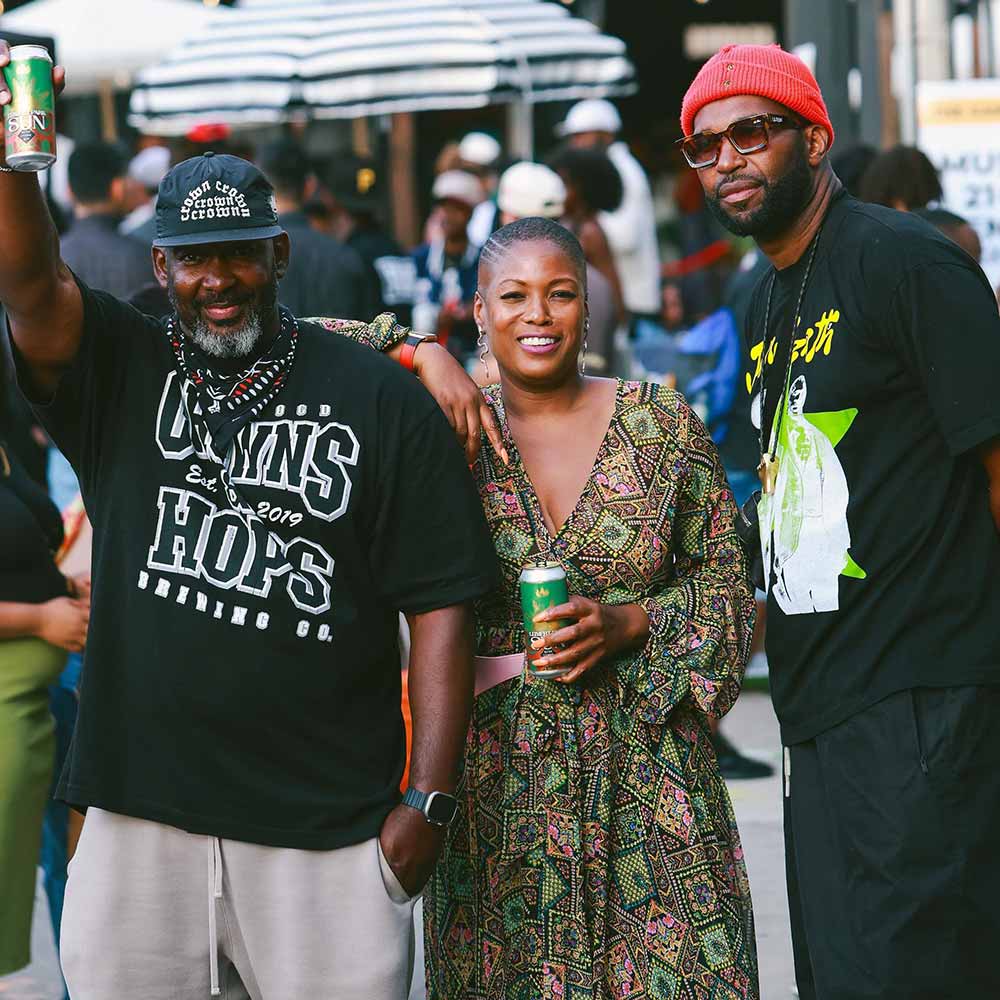
Photography courtesy of @crownsandhops
If thunder follows lightning, Crowns & Hops have no plans to stop storming through the industry anytime soon.
Next up, Hunter and Ashburn plan to open their own brick-and-mortar in the Inglewood neighborhood, “a black hole for craft beer,” says Hunter. “For generations, it’s a city with Black and Brown owners of homes, properties, and businesses, but no craft beer.”
Hunter calls Crowns & Hops’ new space “14,000 square feet of opportunity waiting to come to fruition!”
Located off Crenshaw Blvd and Manchester Ave, a major artery to the community, Crowns & Hops taproom will be within walking distance of SoFi stadium, where the Los Angeles Rams and Los Angeles Chargers play, and the new Intuit Dome, where the Los Angeles Clippers ball.
A dream in the works for two years, the taproom project hasn’t been easy. The pair had trouble locking down a location. “We were losing hope,” says Hunter. But a week after one of their failed bids, their realtor said they’d found the perfect building.
At first, when Hunter and Ashburn walked in off the street, they were confused. With low ceilings, the building didn’t appear to have the right requirements for tall brewing equipment. “Dude, you know what we need; why are we in this building?” Hunter says he asked. But then they walked down a hallway, and everything opened up into this gorgeous high-ceilinged ballroom. Actually an old 1930s bowling alley, the spot proved to be perfect. “Oh my god, we have to figure out a way to get this,” Hunter exclaimed. “We’re excited about opening this space, people championing the space and making it a destination.”
But sometimes, when you’ve worked so tirelessly and frenetically to change an entire industry, it’s worth taking a moment, staring up at the beautiful domed ceiling of your future taproom, taking a breath, standing still, and looking back on how far you’ve come.
Arguably, Crowns & Hops was the first. Not the first Black-owned brewery or brand in craft beer, but the first to put identity, race, culture, and conversation first.
“Now we’re seeing a shift in culture as a result,” says Ashburn. “Watching Crowns & Hops is not just watching any other brand; you’re legitimately watching history being made and disruption in an industry that has not been disrupted ever. Period.”
Ashburn and Hunter hang their hats on what they’ve done proudly.
“We went from influencing a conversation on Instagram to influencing 3,000 barrels a year in the world through our business,” says Hunter. “We are dedicated, focused, and excited for people to see themselves in us and head towards that 13% Black ownership in craft beer.”
If they have one piece of advice for others: Go own your crown.

